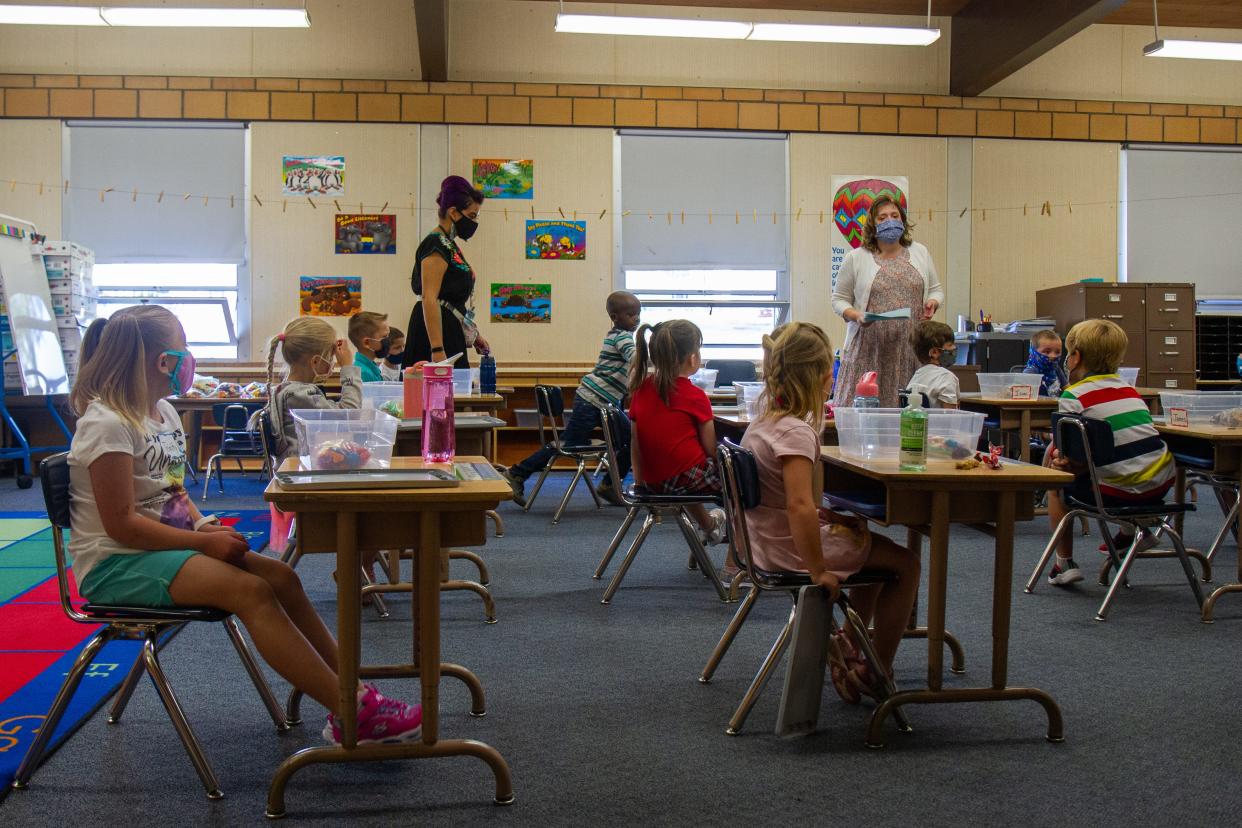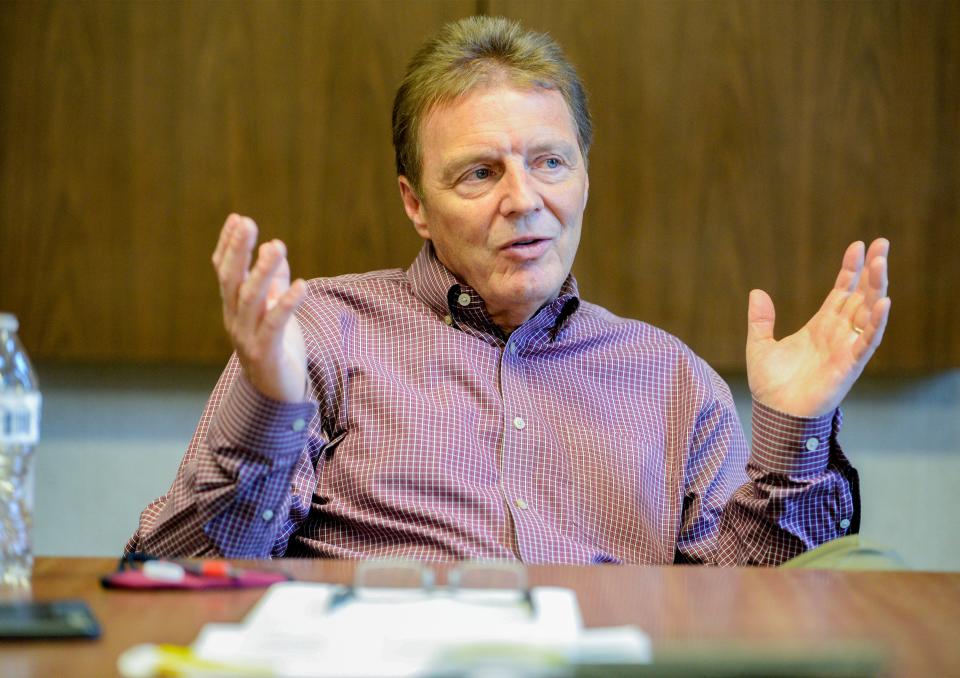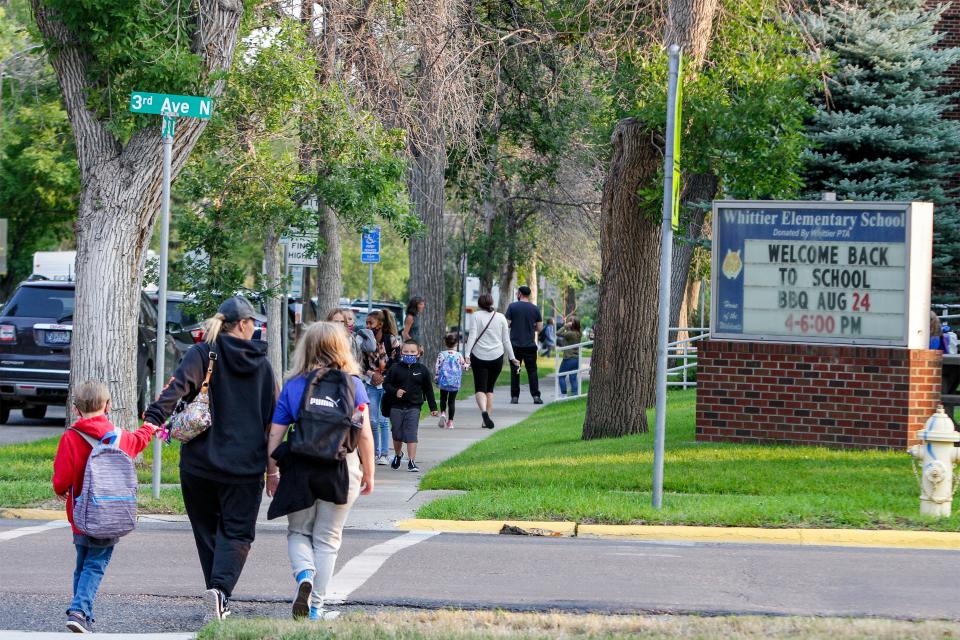Tensions build as Great Falls educators await state forum Monday

- Oops!Something went wrong.Please try again later.
With just two weeks to go before the start of Montana’s 68th legislative session, the window of opportunity for voters to meet with local legislators in their home districts before the session begins is rapidly closing. Great Falls parents and teachers will have that opportunity Monday night at the last one of four community events organized by the Montana Office of Public Instruction (OPI).
OPI held its first “Bridging the Communication Between Schools and Families” event last Monday in Kalispell, describing it as opportunity to focus “on family and community engagement in the education of all our students.”
However, how the events were organized coupled with recent political events is leading some to question if the intent of the meetings is more specifically aimed at drumming up support for a conservative agenda, rather than providing an open forum that would allow parents and educators of all viewpoints to contribute equally.
At the Kalispell meeting attendees called for the dissolution of teachers’ unions, cuts to educator salaries, the integration of conservative values in public schools and an overhaul of history curriculum.
As reported by the Flathead Beacon, throughout the night attendees claimed teachers’ unions were responsible for “funding liberal school board candidates,” lamented the loss of conservative Christian values in public schools and expressed concerns that “the woke bug” was infiltrating Montana schools.
The meeting took on a more combative tone when other attendees pushed back.
“One mother of a young student discouraged 'vilifying the unions' and another older schoolteacher said she did not 'appreciate being told we’re doing a horrible job, and on purpose,'” the Flathead Beacon reported.
Concern about the intent of OPI’s communication events was on the minds of school superintendents prior to the Kalispell meeting. Their concerns were prompted by the lack of communication from OPI, which did not inform the selected school districts about the impending community meetings until just four days before the first meeting was scheduled to take place.
According to Great Falls Superintendent Tom Moore, he first heard about the Bridging the Communication events on Dec. 7, during a Zoom meeting with the state’s seven other AA superintendents.
“The Kalispell superintendent (Micah Hill) asked if any of us had heard about this communication forum that the Superintendent of Public Instruction was setting up across the state of Montana,” Moore recalled. “He said he’d gotten a call from the Evergreen Superintendent up by Kalispell saying OPI Superintendent Elsie Arntzen’s office had called and asked for help getting the word out about a community legislative conversation with parents, legislators and school officials.”
According to Moore, none of the superintendents from the state’s eight largest school districts had been told anything about OPI’s schedule of meetings, nor had they been asked to participate or help facilitate the events.

Early the next morning Moore received a call from Dr. Stephanie Erdmann, Dean of Great Falls College-MSU, informing him that OPI had called and asked to reserve a room at Heritage Hall on the GFC-MSU campus on Monday, Dec. 19, from 4 to 6:30 pm.
“I got a little bit of detail from the Great Falls College folks about what the forum was about and who was going to be there, but not a lot,” Moore recalled. “I checked me emails throughout the day and at the end of the day I ended up calling Superintendent Arntzen.”
It is not unusual for Montana state officials to contact school district superintendents and principals on short notice to request assistance for help with a proposed event. Moore noted how only last month Gov. Greg Gianforte had called a week in advance saying he’d like to come to Great Falls to roll out his new education initiatives.
“We jumped to it, and we accommodated it,” Moore noted.
The difference in this instance was that up until four days before the first Bridging the Communications event was scheduled to take place, there was no direct communication at all from either Arntzen or OPI staff with school district leadership. The only initial communication Moore is aware of is an email sent to Elliot Crump, chairman of the North Central office of the Montana Association of School Superintendents (MASS), four days prior to the Kalispell event.
Crump told Moore that he had only just received the superintendents email the day before and didn’t fully understand what the sessions were about or their significance.
Arntzen explained to Moore that she felt she was going through the proper chain of command to inform school district leadership about, relying upon the MASS to get the word out.
“We were not asked to do any advertising,” said Rob Watson, executive director of School Administrators of Montana. “It’s not like they (OPI) came to us asking for help getting the word out. The flyers were sent to us after everything was already arranged, but they never asked us to send them out to our members. They sent us the flyers as sort of an FYI.”
The lack of communication from OPI could be interpreted as a simple bureaucratic oversight, with no intent to dismiss or exclude teachers school administrators from the conversation. However, it is backlit by two years of increasing and sometimes confrontational activism from conservative parents’ rights organizations, and strained relations between Arntzen and Montana’s school superintendents.
Tensions between Arntzen and Montana’s superintendents came to a head one year ago when all eight of Montana’s AA public school districts sent a letter to Superintendent Arntzen expressing “no confidence in your performance as Montana’s chief public education officer.”
Moore said that since then the relationship between the Great Falls School District and OPI has improved somewhat.
“I can only tell you that we have made an effort, here in Great Falls to reach out to the Superintendent’s Office,” Moore said. “We have attempted to communicate and collaborate to the best of our ability and the response from the Superintendent’s Office when we do that has, for the most part, been fairly well received.”
Moore did have some praise for OPI, applauding the office’s Deputy Superintendent, Dr. Cheryl Allen, for her work in heading a Teacher Recruitment and Retention Task Force.
“Dr. Allen has done a good job of bringing all of the stakeholders across the state together,” Moore said. We’ve had multiple forums on teacher recruitment and retention. They are facilitating ongoing conversations about what to do, what we are doing, what we need to be doing and some strategic work that our legislature can help us with. It’s very collaborative and very inclusive and has been facilitated well.”
However, over the last several months hard-right Republican lawmakers in Montana have drafted a series of controversial bills establishing the right of parents to sue schools for interfering with the upbringing, education and health of their children; prohibiting health care providers that perform abortions from participating in in-school sex education; and barring transgender women and girls from participating on women’s school sports teams.
Executive Director Watson said the issues of concern he hears about most frequently from school superintendents are more specific to the nuts and bolts of providing a quality education.
“Teacher turnover and administrator turnover is at an all-time high, so retaining our quality staff is critically important,” Watson said. “That comes down to a couple of different things … not only pay but also health insurance benefits as well as a place to live, which is becoming harder and harder to find.”
“Then the other major issue right now across all our schools is learning recovery after COVID,” he continued. “That’s a hot topic for a lot of schools working on how to help kids get back on track. The third one would be mental health awareness, not only for kids but also for staff and how we can support students that might be struggling with mental health issues. Those are the big three that I often hear when I speak to superintendents.”

Both Watson and Moore expressed concern that local school politics has become too heated and too personal, both in Montana and across the United States. And that if we as a society continue to use politics as a cudgel to beat over the heads of people we disagree with, we could end up hurting education in Montana more than advancing it.
“Is this particular event (Monday’s education forum) an attempt to further divide us?” Moore asked rhetorically. “I don’t know that. What I can say is that I’m going to be there, and I’ve asked all of our community partners that I have in my circle of influence, both professionally and personally to be there. I’m going to look at it as an opportunity for us to come together as a community and let our legislators know truly what we want.”
“If there is a different plan afoot then that’s going to continue to faction us,” he added. “That will continue to embroil our communities in controversy, and I don’t know that overall, it will accomplish what we really need and that’s providing a high-quality education to every citizen in Montana.”
Moore noted with frustration how for years school officials have attempted to engage parents, encourage them to visit the schools and to talk with teachers and school administrators about the curriculum and other topics parents feel are important to their children’s education – often with little success.
“A handful of parents will serve on PTAs (Parent/Teacher Associations) and get engaged at that level,” he noted, “but they’ll show up by the hundreds for an athletic event or come to concerts where their kids are performing. It’s been difficult to get large groups of parents engaged in what’s going on with their kids’ education.”
“If there are some efforts afoot to improve parent involvement in their children’s schools, that’s a worthwhile endeavor,” he added.
“Education never used to be this divisive,” observed Watson. “Now there’s a questioning or mistrust of teachers and what they’re doing in the classroom that’s really hard for any of us to understand. That’s why it’s so important to operate at the local level because the local Board of Trustees hires those teachers, and they define what the curriculum is going to look like.”
“If a teacher’s doing a great job and following the curriculum there shouldn’t be any mistrust as to what’s happening in the classroom,” he added. “All of that’s fairly transparent, especially at the local level.
“I think that notion of mistrust is really discouraging for educators. None of us went into this business because of the potential political ramifications. We went into this business because we love working with kids and we love teaching. That’s where our heart is at.”
Moore said he’s looking ahead to Monday’s event with optimism.
“How it came to be isn’t as important as the opportunity to get in front of our legislators and share with them the things that we believe are important,” he asserted. “I think if we don’t do some really good work together to try and move forward then we’re just going to continue to faction our society and our world.”
“Whether people are always doing things the right way or are always well intended – I think that’s debatable,” he continued. “But no matter what the intent was or how it transpired – here’s the opportunity for us to do something good - come together as a community, talk about what our priorities are for our kids, ask our legislators to listen to us and then go out and do that.”
Join the conversation
What: Bridging the Communication Between Schools and Families
When: 4:30 to 6 p.m.
Where: Great Falls College in Heritage Hall, 2100 16th Avenue South
Info: The event is free and open to the public
This article originally appeared on Great Falls Tribune: Tensions build as Great Falls educators await state forum Monday

